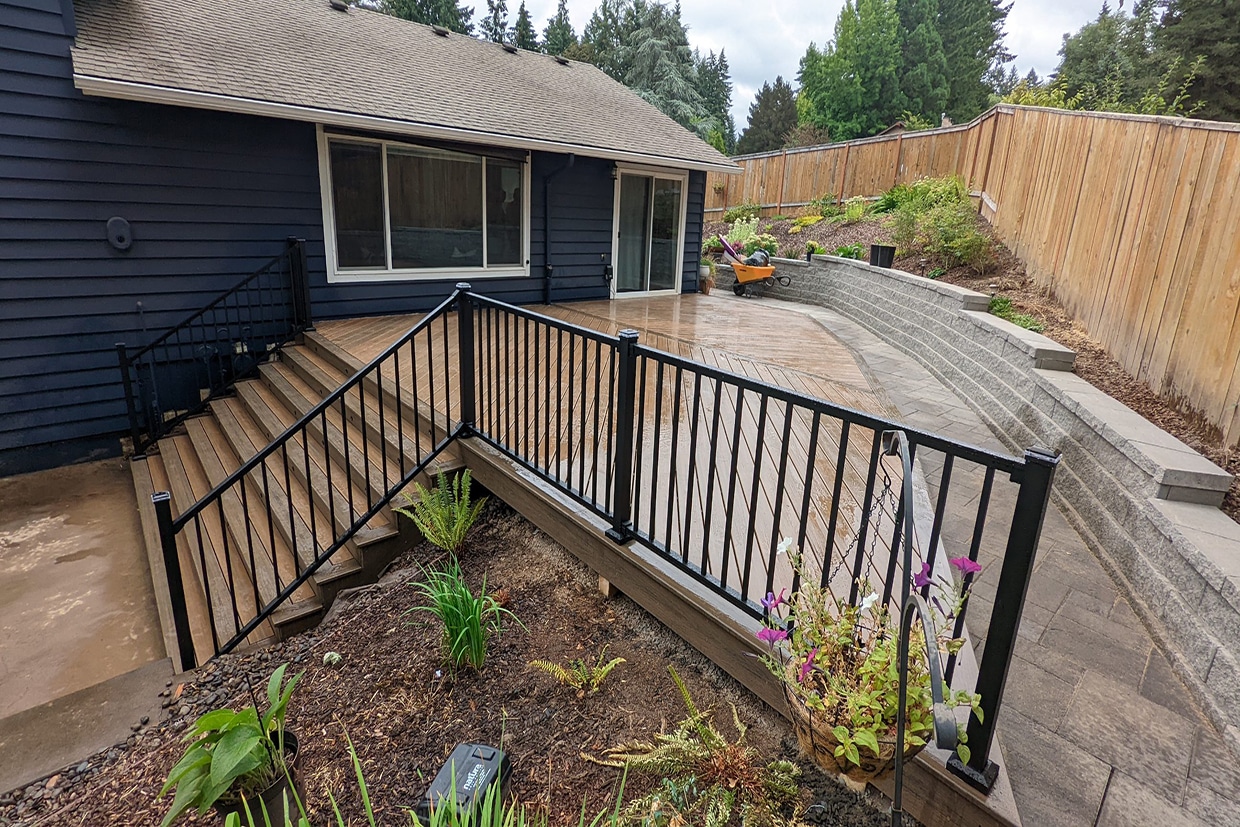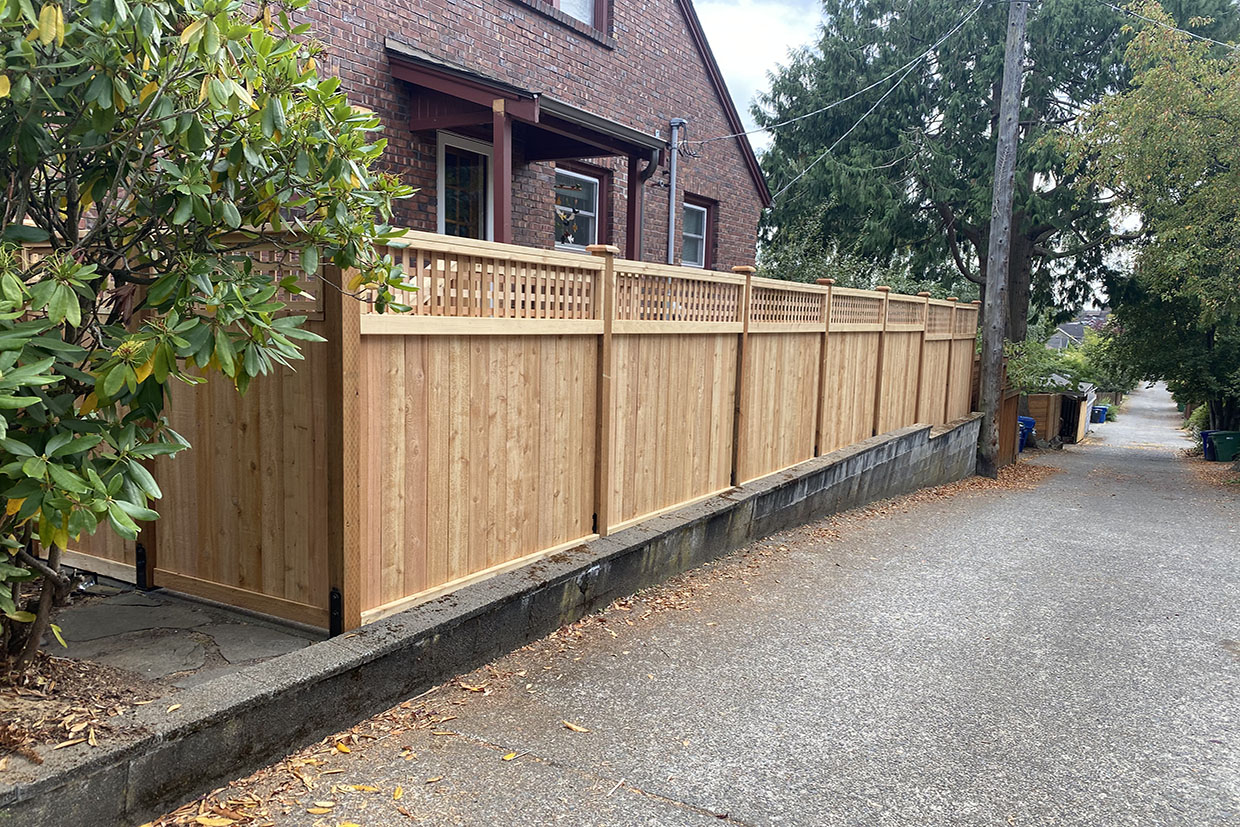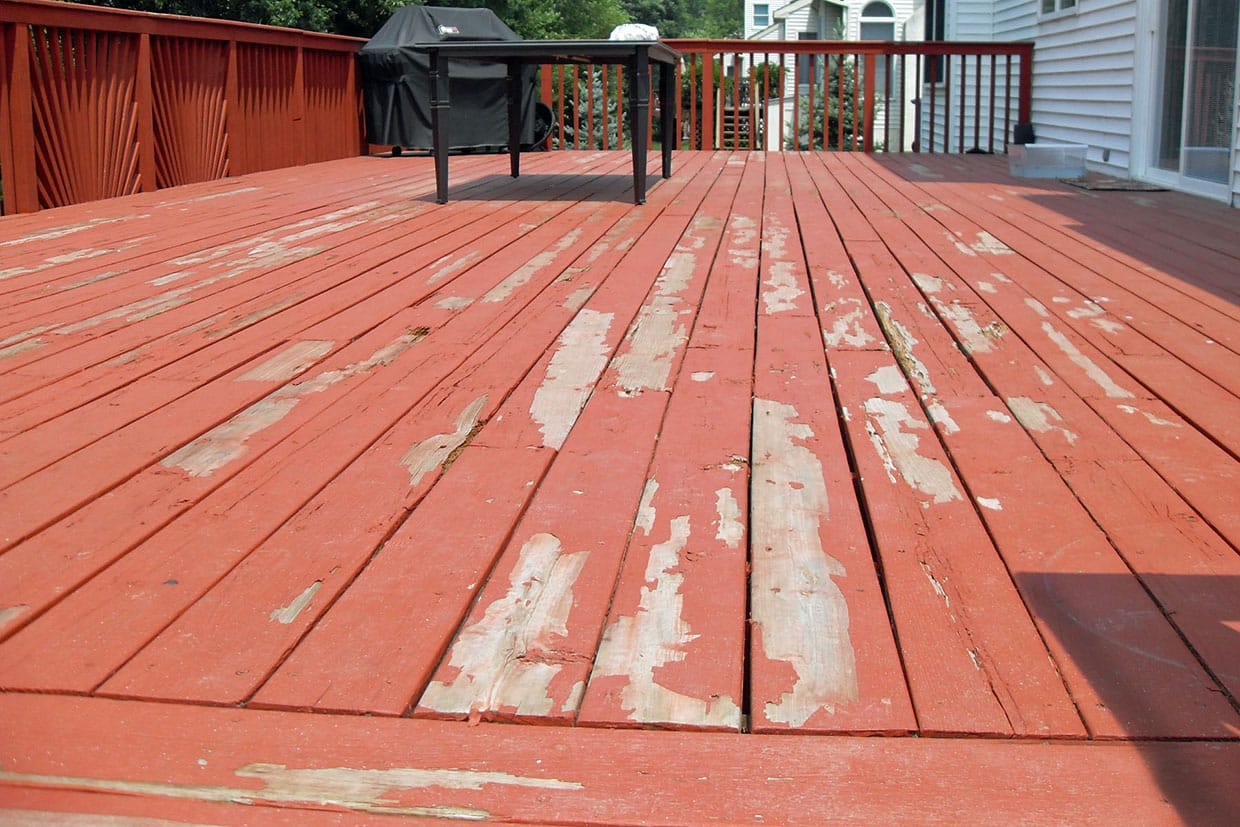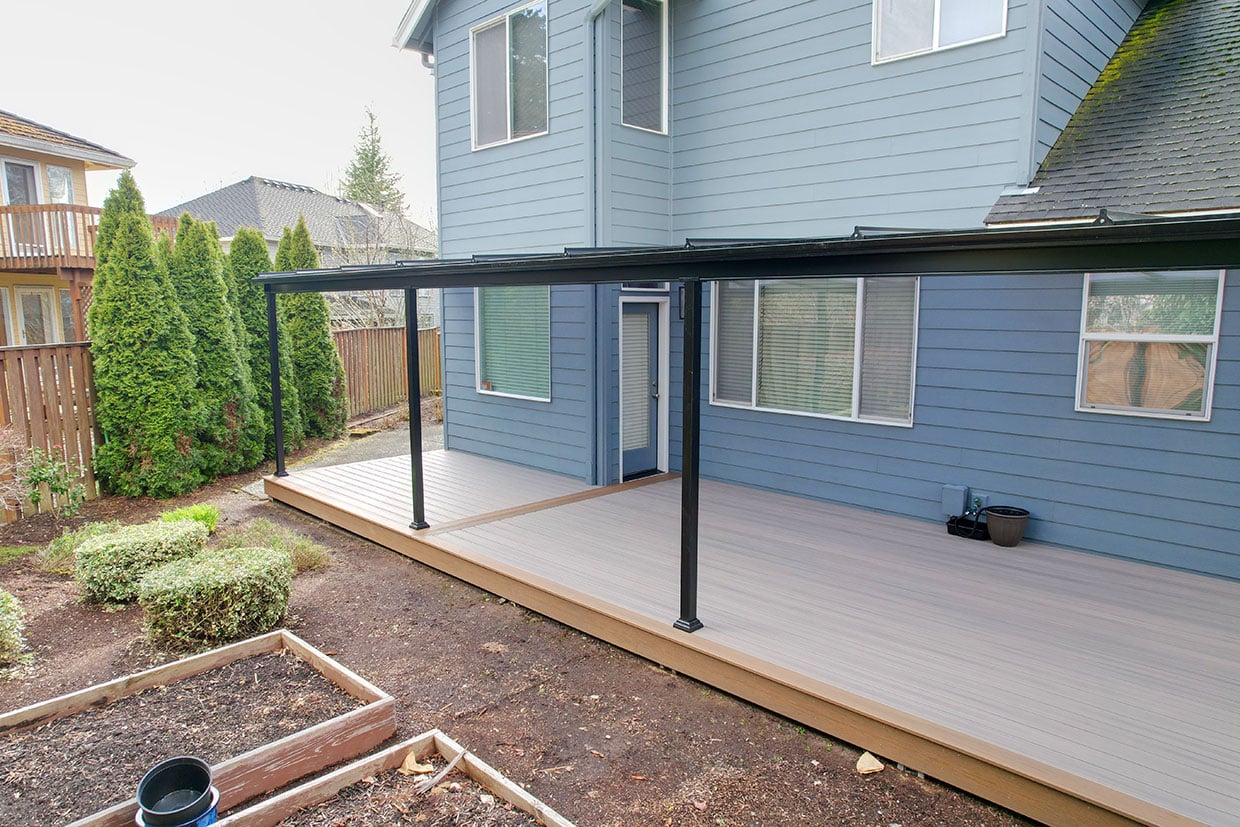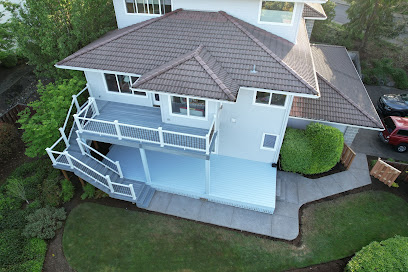If your deck is aging and worn, you’re likely considering options for a refresh. Many homeowners face a common dilemma: should they demolish the old deck or simply resurface your deck with composite or wood material?
Imagine lounging on your rejuvenated deck during a balmy summer evening, laughing with friends, sipping your favorite cold drink, and enjoying the outdoors. Doesn’t that seem enticing? An outdated deck may keep you from such pleasures, but revitalizing it not only enhances your outdoor living experience but also boosts your home’s value and visual appeal. Unfortunately, all structures deteriorate over time, and a deck is no exception. It may lose all its charm with weathered boards and a dull appearance leaving homeowners with a big (and potentially- expensive) decision to make.
Resurfacing a deck with composite or wood breathes new life into your old deck, making it look brand new without the expense or inconvenience of a complete replacement. The main choice homeowners face during this renovation is selecting the appropriate material: composite or wood decking.
In this blog, we’ll explore the advantages and drawbacks of both composite and wood decking to equip you with the information required to make an informed decision for your deck resurfacing endeavor. Don’t forget, our team at Grand Decks is ready and willing to provide you with professional guidance and services, ensuring your newly resurfaced deck surpasses your aspirations. Let’s begin!
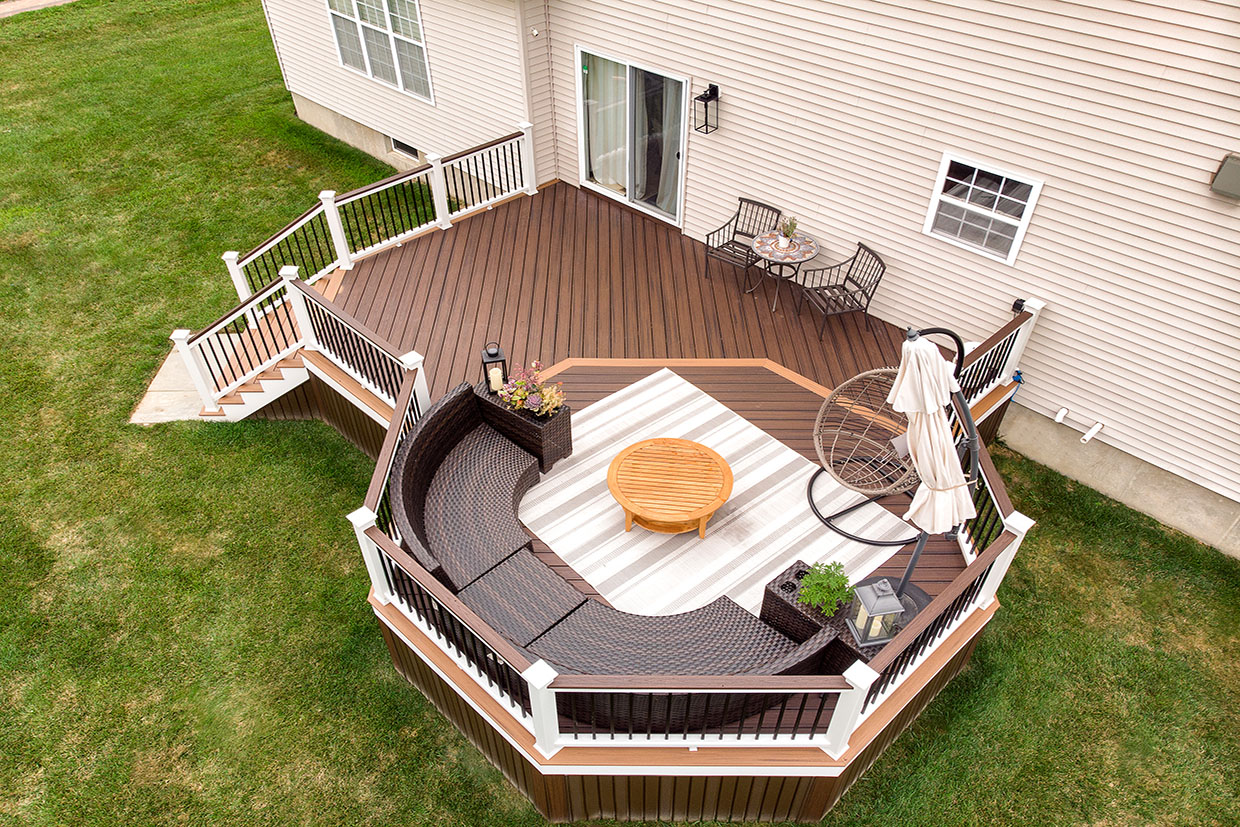
What is Deck Resurfacing?
Deck resurfacing involves the removal and replacement of the top layer of your deck with a new material, without replacing the underlying structure. Resurfacing can significantly enhance your deck’s longevity and visual appeal while avoiding the cost and complexity of full deck replacement.
At Grand Decks, the deck resurfacing process begins with a comprehensive evaluation of your existing deck’s condition, ensuring the underlying structure is still strong and secure. Our professional team then meticulously removes the old deck surface, taking care not to damage the underlying frame.
Next, the team prepares the surface, making necessary repairs to the structure and ensuring it’s ready for the new decking. The choice of new material – be it wood or composite – is then meticulously installed, cut to fit the deck’s dimensions precisely. Throughout the process, our professionals ensure all safety standards are met, and the installation is carried out efficiently, maintaining a clean workspace.
Once the resurfacing is complete, a final inspection is performed to ensure the new deck meets our high-quality standards. By choosing Grand Decks for your resurfacing project, you can expect a revitalized deck that not only looks brand new but offers enhanced durability and longevity.
Deck resurfacing presents several significant advantages over demolishing and entirely rebuilding a deck:
- Cost-Efficient: Resurfacing generally costs much less than a complete deck replacement, as you’re only replacing the surface boards, not the underlying structure.
- Time-Saving: Deck resurfacing is typically a quicker process than a full deck rebuild. There’s no need to demolish the existing structure and start from scratch, which means you can enjoy your refreshed outdoor space sooner.
- Less Disruptive: Resurfacing avoids the noise, dust, and disruption associated with demolition and construction. It’s less invasive and usually doesn’t require significant changes to your landscaping or garden.
- Environmental Considerations: By preserving the existing deck structure, you reduce the demand for new materials, which can be more sustainable and eco-friendly.
- Preserves Existing Structure: If your deck’s frame is still in good condition, resurfacing allows you to maintain the existing design and structure, ensuring the integrity and familiarity of your outdoor space.
- Visual Appeal: A resurfaced deck can look just as beautiful as a brand-new deck, giving your outdoor space a facelift without the need for a complete rebuild.
Consulting with a professional deck resurface specialist is the first step in deciding if your existing deck is a good candidate for deck resurfacing. Contact Grand Decks today to book your FREE consultation.
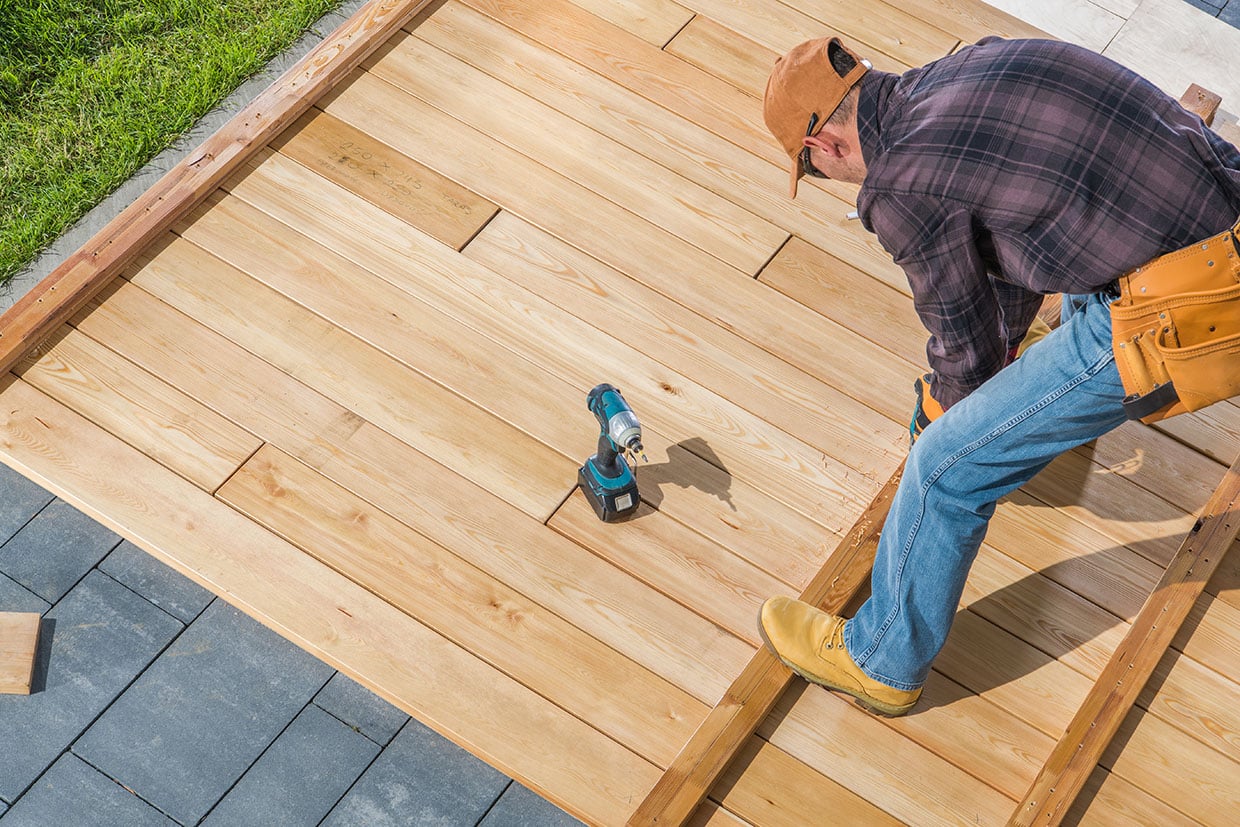
What Are The Pros And Cons of Wood Decking?
Wood has been a classic decking material for generations. Its natural beauty, the diverse range of types and colors, and lower upfront costs make it a favorite among many homeowners. However, wood decking requires frequent maintenance, and is prone to weather damage and pest infestation, potentially leading to higher long-term costs. Regardless, wood is still a popular choice among our customers looking to resurface a deck.
Pros of Using Wood to Resurface a Deck:
Building a wood deck, as opposed to a composite one, has several key benefits which might make it the preferred choice for some homeowners:
- Natural Beauty: Wood offers a classic, natural aesthetic that many homeowners love. It can easily complement a variety of architectural styles and garden designs.
- Variety: Wood comes in many different types and styles, each with its unique color, grain, and texture. This variety allows homeowners to select a type of wood that suits their taste and the design of their home.
- Cost: Wood decking is typically less expensive upfront than composite decking. This lower initial investment can make it an attractive option for homeowners on a tight budget.
- Refinishing Potential: Over time, if a wood deck becomes worn or the homeowner wants to change its color, it can be sanded and refinished. This flexibility allows for more extensive changes without complete replacement.
- Temperature: Wood does not absorb as much heat as composite decking, making it more comfortable underfoot in hot weather conditions.
Cons of Using Wood to Resurface a Deck:
While wood decks have their advantages, they also come with several potential downsides that homeowners should consider:
- Maintenance: Wood decks require regular upkeep, including staining, sealing, and occasionally painting to maintain their beauty and durability. This regular maintenance can add to the deck’s overall lifetime cost.
- Durability: Wood, especially if not well-maintained, can be more susceptible to weathering, rot, splintering, and warping compared to composite materials. This could potentially shorten the lifespan of a wood deck.
- Pest Vulnerability: Depending on the type of wood used, some decks can be susceptible to pest infestations, such as termites, which can cause significant damage over time.
- Environmental Impact: Unless sourced responsibly, the use of wood for decking can contribute to deforestation. It’s important to look for wood sourced from sustainable forestry practices.
- Inconsistent Appearance: Natural variations in wood can lead to inconsistencies in color, grain, and texture, which some homeowners might find undesirable. Over time, wood can also fade or change color due to exposure to the elements.
- Safety: Wood decks can be very slippery when wet and may pose a risk of splinters or falls if not well-maintained.
At the end of the day, it’s important to be aware that wood decks do require regular and consistent maintenance, including sealing and staining, to prevent rot, splintering, and weather damage. However, for many homeowners, the extra maintenance is a worthwhile trade-off for the beauty and warmth of a natural wood deck.
What Are Pros and Cons of Composite Decking?
Composite decking, made from a mix of wood fibers and plastic, offers a modern alternative to traditional wood. Its key advantages include low maintenance needs, high durability, and resistance to weather and pests. On the downside, composite decking comes with a higher initial investment and may retain heat, making it warm to the touch in sunny conditions.
Pros of Using Composite to Resurface a Deck:
Using composite materials for deck resurfacing can offer several key advantages:
- Low Maintenance: Simply put, composite decks require less maintenance than wood decks. There is no need for regular painting, staining, or sealing, which saves both time and money over time.
- Consistent Appearance: Composite decking offers a uniform look without the natural variations found in wood, and it doesn’t fade or change color over time.
- Durability: Composite materials are highly resistant to rot, splintering, and warping, providing a durable surface that can withstand the elements, whether rain or shine.
- Resistance to Pests: Unlike wood, composite decking isn’t susceptible to termites and other pests that can damage your deck meaning your deck can last decades longer than wood.
- Eco-Friendly: Many composite decks are made from recycled plastic and wood fibers, making them a more sustainable choice.
Cons of Using Composite to Resurface a Deck:
Even though composite material has several benefits, it does come with a few potential downsides:
- Higher Initial Cost: Composite decking typically has a higher upfront cost compared to wood decking. While the lower maintenance requirements can offset this over time, the initial investment may be prohibitive for some homeowners.
- Heat Retention: Composite decking can absorb and retain heat, which may make it uncomfortable to walk on with bare feet in hot weather.
- Limited Refinishing Options: Unlike wood, composite decking cannot be sanded or refinished. If it gets damaged or if you decide to change its color, replacement is the only option.
- Potential for Scratches: Composite materials can be more prone to scratches, which can be challenging to repair and may impact the deck’s overall aesthetic.
The choice between composite and wood decking will depend on a homeowner’s specific needs, preferences, and budget. To view some of the amazing composite options through Grand Decks, take a look at our Showcase.
Key Factors to Consider When Choosing Between Wood and Composite
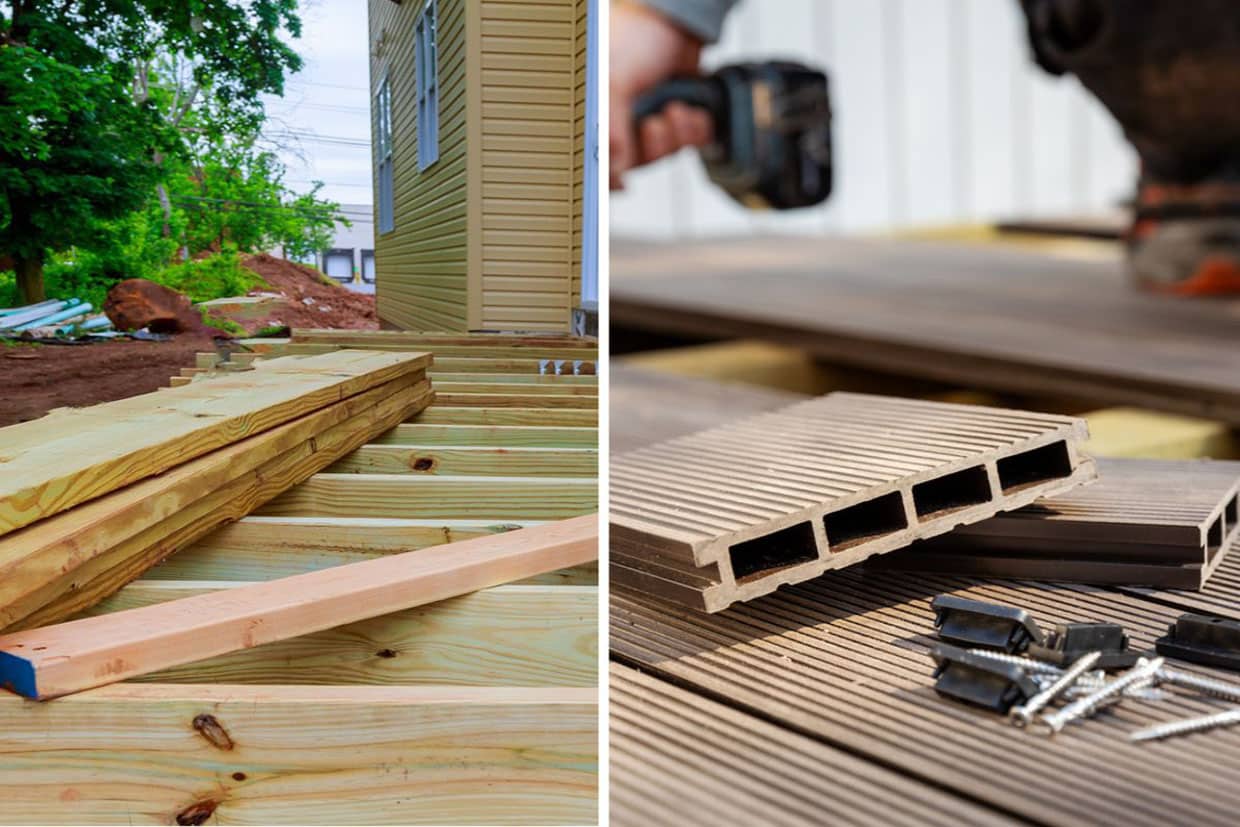
Choosing between wood and composite decking for a resurfacing project can be a complex decision as there are so many amazing options out there. So in order to help you decide, here are some crucial factors to consider to help homeowners make an informed choice:
- Budget: Wood decking often has a lower upfront cost than composite decking. However, considering the ongoing maintenance costs associated with wood, the overall cost difference may decrease over time.
- Maintenance: Wood requires regular maintenance, including staining, sealing, and sometimes painting, while composite decking is virtually maintenance-free. Evaluate your willingness and ability to maintain the deck, as it could influence the longevity and appearance of the decking material.
- Aesthetics: This comes down to personal preference. Wood offers a natural, classic look and comes in various species, each with a unique color and grain pattern. On the other hand, composite decking offers more uniformity and can mimic the look of many types of wood without the associated maintenance.
- Climate: The local climate should be a crucial factor in your decision. If you live in a region with a hot climate, composite decking can become uncomfortably hot in the sun. In areas prone to moisture, wood decks can warp or rot without proper care, while composite decks can resist these weather impacts.
- Durability and Lifespan: Composite decking is highly durable and resistant to elements like moisture and pests, potentially leading to a longer lifespan. Wood decks, especially if well-maintained, can also last a long time but may show signs of wear sooner.
- Environmental Impact: If environmental considerations are important to you, note that many composite decks are made from recycled materials, making them a more sustainable choice. For wood, look for suppliers who source from sustainably managed forests.
- Comfort: Consider the deck’s comfort level under your feet. Wood does not retain as much heat as composite, which might be more comfortable in hot climates.
Tip: Before deciding, try to view both materials in person. See how they feel under your feet, how they look in natural light, and how they may complement your home’s style. This hands-on experience could help you make the best choice.
Grand Decks provides a range of services, from consulting to installation, to assist you in making the best choice for your deck. Our professional guidance can be invaluable in making a decision that satisfies your needs and budget. Call us today or come into our showroom to view the vast wood and composite materials we have available.
Making the Right Choice: Consulting with Grand Decks
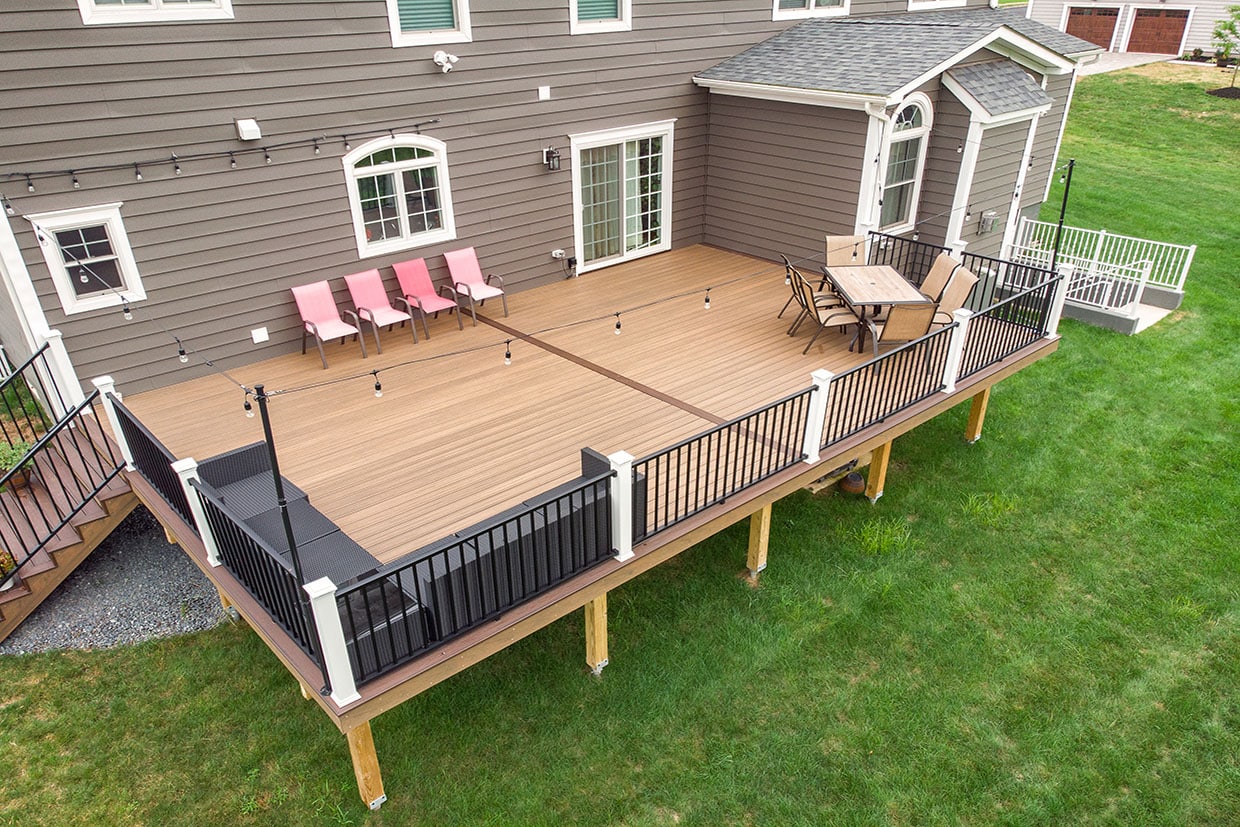
The decision to resurface a deck with either wood or composite material is multifaceted, involving various factors such as budget, maintenance requirements, aesthetic preference, local climate, durability, environmental impact, and your personal preferences. Wood decking offers natural beauty and initial cost savings but requires regular upkeep which can be a headache for some homeowners. In contrast, composite decking provides low maintenance, high durability, and a more consistent appearance, albeit with a higher upfront cost and potential for heat retention.
Making the right choice for your deck resurfacing project requires careful consideration, balancing the pros and cons of each option against your personal needs and circumstances. No matter your choice, rest assured that a resurfaced deck with composite or wood can breathe new life into your outdoor space, enhancing your home’s aesthetic appeal and value without the cost and hassle of a full replacement.
At Grand Decks, we are dedicated to helping homeowners make the best decision for their deck resurfacing needs. Our team of professionals is ready to provide expert advice tailored to your unique situation, ensuring your newly resurfaced deck meets your expectations and offers a comfortable, inviting outdoor space for years to come.
We encourage you to reach out to Grand Decks for further advice or to schedule your deck resurfacing. Let us help you transform your worn-out deck into a beautiful and enjoyable outdoor living area. Contac Grand Decks today for a free, no obligation, consultation.
